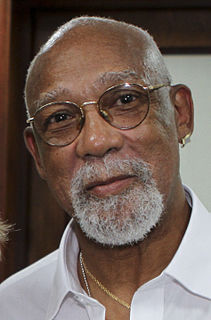A Quote by Jiddu Krishnamurti
Knowledge, idea, belief stands in the way of wisdom.
Related Quotes
Wisdom and knowledge can best be understood together. Knowledge is learning, the power of the mind to understand and describe the universe. Wisdom is knowing how to apply knowledge and how not to apply it. Knowledge is knowing what to say; wisdom is knowing whether or not to say it. Knowledge gives answers; wisdom asks questions. Knowledge can be taught, wisdom grows from experience.
During the last century, and part of the one before, it was widely held that there was an unreconcilable conflict between knowledge and belief. The opinion prevailed amoung advanced minds that it was time that belief should be replaced increasingly by knowledge; belief that did not itself rest on knowledge was superstition, and as such had to be opposed. According to this conception, the sole function of education was to open the way to thinking and knowing, and the school, as the outstanding organ for the people's education, must serve that end exclusively.
WISDOM IS dependent upon knowledge. Where there is complete ignorance there can be no wisdom, no knowledge of the right thing to do. Man’s knowledge is comparatively limited and so his wisdom must be small, unless he can connect his mind with a knowledge greater than his own and draw from it, by inspiration, the wisdom that his own limitations deny him. Only God knows all truth; therefore only God can have Real wisdom or know the right thing to do at all times, and man can receive wisdom from God. Wisdom is obtained by reading the mind of God.
You can use reading as a food for the ego. It is very subtle. You can become knowledgeable; then it is dangerous and harmful. Then you are poisoning yourself, because knowledge is not knowing, knowledge is not wisdom. Wisdom has nothing to do with knowledge. Wisdom can exist in total ignorance also. If you use reading just as a food for the mind, to increase your memory, then you are in a wrong direction. But reading can be used in a different way; then reading is as beautiful as anything else in life
Everyone recognizes a distinction between knowledge and wisdom. . . Wisdom is a kind of knowledge. It is knowledge of the nature, career, and consequences of human values. Since these cannot be separated from the human organism and the social scene, the moral ways of man cannot be understood without knowledge of the ways of things and institutions.
The hope of the world is that wisdom can arrest conflict between brothers. I believe that war is the deadly harvest of arrogant and unreasoning minds. And I find grounds for this belief in the wisdom literature of Proverbs. It says in effect this: Panic strikes like a storm and calamity comes like a whirlwind to those who hate knowledge and ignore their God.
Until the content of a belief is made clear, the appeal to accept the belief on faith is beside the point, for one would not know what one has accepted. The request for the meaning of a religious belief is logically prior to the question of accepting that belief on faith or to the question of whether that belief constitutes knowledge.
A philosopher is a lover of wisdom, not of knowledge, which for all its great uses ultimately suffers from the crippling effect of ephemerality. All knowledge is transient, linked to the world around it and subject to change as the world changes, whereas wisdom, true wisdom is eternal, immutable. To be philosophical one must love wisdom for its own sake, accept its permanent validity and yet its perpetual irrelevance. It is the fate of the wise to understand the process of history and yet never to shape it.







































